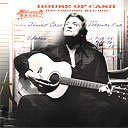 Short version: If you know anything about Johnny Cash you'll already consider this collection (Personal File) essential. Get it.
Short version: If you know anything about Johnny Cash you'll already consider this collection (Personal File) essential. Get it.Longer, killing time and filling up space on the blog version: I've always said (always= long before he became a ubiquitous byword for "hip") that Johnny Cash was a folk singer, not a country singer. Now, I admit partially I've adopted that argument because of certain peoples' knee-jerk aversion to any music called country. He was a country singer. But think of other major country music figures of the 60s. Think of their output and think of Cash's, in that period. To me, the difference is one of kind, not just degree. That's not to deny he was a country music giant, he was. But that doesn't quite cover it all.
Cash took country -- unmistakenly and proudly Southern, sentimental, conservative, redolent of history and tradition and met it's black sheep brother folk head on. Folk: progressive, traditional (not the same as conservative) contrary, stories of the soil, always room for protest. I don't believe in a golden age of purity which remained unsullied by commercial considerations. Without the impulse to create a better material life, the Carter family would never have trucked it down to Bristol and if Hank Williams didn't make money for a lot of folks he'd just be another semi-overlooked obscurity in the vaults now. We can bitch about the Nashville assembly line, forgetting our favourite "traditional" artists were created by that very same system and Sam Phillips had his eye on the prize as much as anyone on Music Row 2006. Having said that, no label exec would have advised Johnny Cash to record in 1964 Bitter Tears, an album of militant Native American rights songs. Nineteen Sixty Four -- just as the folk boom started to spread gingerly beyond Greenwich Village. That was all his own doing. He had the clout to drag Columbia along and the guts to stand up to radio about it. You won't see that in Walk The Line but I hope some of those turned on by the film will discover it. Even considering his more mainstream offerings of train songs, the wild west, pioneers and love ballads, it's not really tears-in-your-beer stuff. Hearing Cash cover a pedal steel country classic like "He Stopped Loving her Today" (included in the Unearthed box set) is as novel in a way as him doing a Nine Inch Nails song.
So while everyone is calling Personal File an antecedant to the American Recordings series, and it's certainly being marketed that way, it's really a continuation of his regular '60s output. In 1994, Rick Rubin masterfully put all the elements together, but they were elements already existing in the life and work of Cash. The mix of songs, here heavy on spirituals, are the same as earlier albums, as are the spoken word introductions. He does this often on other official material, the theme albums in particular. It's 2 CDs, really beautifully packaged with liner notes by Greil Marcus. The Maestro of the Obtuse keeps it pretty fact-filled and straight-forward. The songs are all solo, acoustic and were recorded at the Cash house in Hendersonville (the one on the lake in the movie) with engineer Charlie Bragg on hand. Most of the songs are from 1973, with others from the 70s and early 80s. Interestingly to me, he does the Cindy Walker song "Jim, I Wore a Tie Today" which later turned up on the first Highwaymen album. Many will know and love the John Prine song "Paradise" which Cash sometimes did live. This is a slow version with a slightly odd tempo, he might have been experimenting. Another standout is the J.R Cash orginal "I Wanted So" which shows off the fact his voice was never better than in this period. At 50 songs you can afford to skip over a few of the gospel numbers if they get a bit samey (I'm not keen on "If Jesus Loved a Woman" about Mary Magdalene, but maybe the Da Vinci Code hooha has put me off that topic for life) and still find plenty to return to.
UPDATE: My friend Tom is way ahead of me.
No comments:
Post a Comment